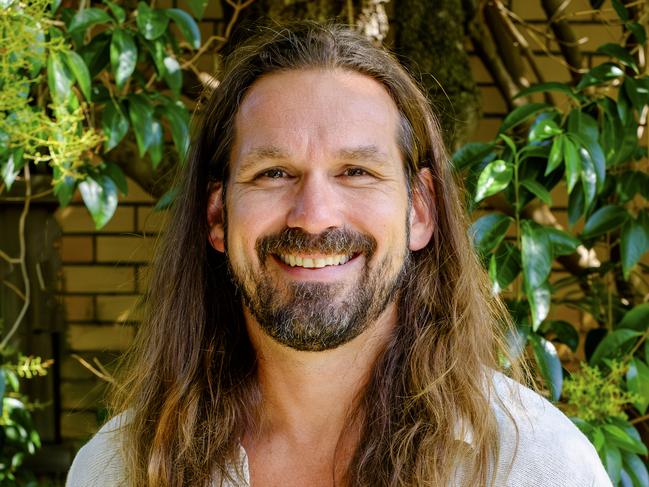Dissatisfied, stagnant or in a rut? You might be languishing
The state of joyless stagnation, emptiness and low wellbeing is a condition Kurt Annis is familiar with. It prompted the then insurance broker to take action.

It’s that sense that life just isn’t quite where you thought it would be by now, but it is not clinical depression or anxiety. It’s languishing; a psychological term researchers are using to describe a state of joyless stagnation, emptiness and low wellbeing, without the symptoms of mental illness. It’s a condition Kurt Annis is familiar with.
In a previous career as an insurance broker, he found himself disconnected and disengaged to a point where his life and relationships began to unravel.
“I was feeling like I wasn’t happy,” he says. “I wasn’t sad, but I was just numb and getting up and going into work. Everything became too hard, like, I became unfit, got a little bit fat.
“I was looking around at all the people I’m working with and just felt, first of all, these are not my people, and second, this is not where I want to see myself in another 10 years. I was seeing my manager was looking forward to his one holiday for the year, and I was like, far out, I don’t want to be doing that in 15 years’ time, where my only happiness is the holiday that I take once a year.”

So, the now 43-year-old took action by quitting the job he was good at and embarking on a new photography career that he knew would nurture his creative side. He also tried to get more social and look after his wellbeing.
It was through his work that he became aware of the term “languishing” while working on a project looking into the state of being. It resonated with him, providing a word to a feeling he had experienced for years. Giving it a name also helped him to understand what it was and develop strategies to overcome it.
“In the last six to 12 months, I’ve started getting back into my health and wellness and fitness, and that’s really changed things,” he says. “It’s definitely had a huge impact on my life, in my mental health and personality and everything.”
The state of languishing has been the subject of an Australian-first study with the aim of helping researchers to understand its role in the nation’s ongoing mental health crisis. They say their findings show it is having a significant impact – one in five Australians surveyed reported they were “languishing” without mental illness. That was on top of the 40 per cent of respondents who reported moderate levels of depression, anxiety, and stress.
The long-term collaborative study was designed to capture the scale of the largely invisible sense of languishing. It followed the wellbeing of 16,000 people over a five-year period and was conducted by Be Well Co and co-authored by Dr Joep van Agteren and Dr Matthew Iasiello. They say the findings highlight the urgent need for action, equating languishing to the “neglected middle child of mental health”.
“You might struggle with your relationships,” Dr van Agteren says. “You might not experience as much joy as you used to. You’re not really setting the same amount of goals, so you’re not really feeling a lot of forward energy; you feel a bit stuck and stagnant.”
They found people who were languishing were at a heightened risk of experiencing mental or physical ill health in the future. But it is more than just that. Dr van Agteren says languishing is also a form of suffering and is too serious to simply ignore or dismiss.

“These people are suffering in silence while telling themselves that how they feel is normal,” he says. “It’s not. I would not want to feel joyless or stuck and I don’t want my family or friends to feel like that either.
“Since we started measuring this five years ago, there’s not really a lot of positive change happening, and I think that kind of marries up with a lot of the signals that are coming from the mental health industry.”
The report’s release comes at a time when there is immense pressure on Australia’s mental health system, with patients struggling to access the help they need and, and in NSW, mass resignations of the state’s psychiatrists stretching an already strained system.
Researchers found the impact of languishing had economic effects, with those experiencing it having decreased productivity and engagement in the workplace, both of which can come at a financial cost to businesses. The study also challenges the popular thought that happiness is strongest in younger and older people and dips in midlife. Instead, the results suggest younger people are languishing at high levels.
“The 20 per cent of people that are struggling with this experience really shouldn’t feel like this is normal and they’re stuck with this for the rest of their lives, and we as a society shouldn’t accept that this is normal. We should all strive to feel happy about ourselves and where our life is headed,” Dr van Agteren says.
Researchers say languishing can be overcome with relatively low levels of professional intervention and believe addressing it early could prevent it from developing into a more prominent mental illness. They say that would in turn relieve pressure on the nation’s mental health system.

Dr van Agteren says one fix is social prescribing, where people are connected with activities, groups, or services that could help them with their practical, social or emotional needs.
“A big driver of languishing is a failure to connect with other people in society. So, going out there and trying to become more active in groups or picking up a hobby with other people actually is a great way of improving your wellbeing. But there’s also a whole bunch of psychological activities that you can do that are pretty easy to find … so mindfulness and other approaches like positive psychology.”
It’s an approach Mr Annis has found useful. He has written and self-published two children’s books, and joined the 5am club, which he says has worked wonders for his mental clarity.
“Getting up early, embracing life early actually changes your day so much better than sleeping until 8.30 or 9 o’clock. And cold plunges. Do them everyday, that’ll change your life,” he says with a laugh.
.





To join the conversation, please log in. Don't have an account? Register
Join the conversation, you are commenting as Logout